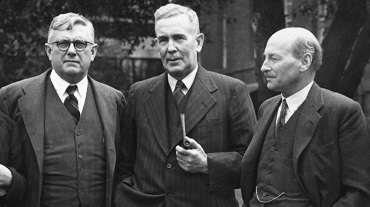The Australian Alert Service is the weekly publication of the Australian Citizens Party.
It will keep you updated on strategic events both in Australia, and worldwide, as well as the organising activities of the Citizens Party.
To subscribe to the Australian Alert Service, it's easy, and it's secure.
Lead Editorial
10 August 2022
Vol. 24 No. 32
The Australian government “squibbed it” last week, failing to use its influence to avert an international crisis over Taiwan.
The whole world knew US House Speaker Nancy Pelosi’s stunt in visiting Taiwan and meeting its independence leaders was an extreme provocation, which is why even the White House and the Pentagon advised against it (although China’s view is that Biden should and could have stopped her).
Australia knew it too, but because it was the USA, Prime Minister Anthony Albanese and Foreign Minister Penny Wong refused to comment, calling it “a matter for them” (p. 5).
This is the same cowardice they display on the issue of Julian Assange—Albanese knows Assange’s incarceration is wrong but won’t demand our US-UK allies do the right thing.
Yet Australia is one country that is in a position to make demands of the USA—our involvement in every war it has fought for more than a century, including the disastrous, criminal post-WWII conflicts, must count for something.
Imagine if Albanese and Wong had spoken up publicly to tell Pelosi not to go to Taiwan, in the interest of maintaining peace and calm in our region?
Such a message would have put the Speaker on the spot, because she wouldn’t want to be seen to be disregarding such a loyal ally, and would have had a good chance of averting an unnecessary provocation and keeping the peace.
As it happened, however, Penny Wong didn’t even communicate Australia’s concerns privately to the United States.
On 8 August AAS asked the Department of Foreign Affairs and Trade (DFAT): did Minister Wong at any point communicate concern to the United States regarding the visit of US Speaker of the House of Representatives Nancy Pelosi to Taiwan?
“Good question”, DFAT’s media unit responded, but after more than 24 hours they couldn’t find an answer, because she didn’t.
So, nothing but supine silence on Pelosi’s provocation, yet as soon as China reacted—in exactly the way they have warned the world for 50 years they would react to any attempt to subvert the One China policy—Penny Wong was quick to publicly criticise China’s response.
(By contrast, former New Zealand Prime Minister John Key didn’t hold back on Pelosi’s visit: “In my opinion it was reckless, if you want to be kind”, stuff.co.nz reported 7 August. “It was provocative, and it was actually dangerous.”)
Australia’s ongoing strategic subservience to our US and UK “dangerous allies”, as the late Malcolm Fraser called them, is the reason Australian governments hold double standards which infuriate many nations, not just China, and undermine peaceful international relations.
Let’s flip the picture and imagine what Australia could do on the world stage.
For instance, if the Citizens Party and our collaborators succeed in establishing a postal bank, this achievement would be far greater than just a new financial institution. It would mean Australia, in response to the intensifying disasters in the economy, has acted against the interests of the financial elite and put the needs of the people first.
This would be a dramatic change from how our country and the UK and USA have long operated, with the banks having free rein to plunder the economy and no consequences for their disasters, such as in 2008 when they were too big to fail and too big to jail.
Australia led the world on public banking in the 20th century with the Commonwealth Bank, which was so effective in WWII it even inspired the UK to nationalise the Bank of England.
Today, countries like China and Japan show what public banks can do, but their success is discounted; if Australia joined them—which really means reviving our own public banking tradition—our success would boost the movements in the USA and UK waging their own fights for national infrastructure banks.
We could be a positive example for progress, instead of an accomplice in wars.
In this issue:
- Stop Conroy taking Australia Post back to ‘dark days’
- A public postal bank could solve financing needs of local government
- An independent Australia would oppose US provocations in the Asia Pacific
- Strategic Ambiguity—An update
- Indonesian government, US experts say AUKUS undermines NPT
- Pelosi’s swan song: start World War III
- Interest rate hikes will not save us from inflation
- What the West fears: Russia and China push sovereign development
- Afghanistan: Economic reconstruction is key to peace
- Without banks, we have to save the post office!
- Lies paint us into a ‘nuclear’ corner
- Shakespeare: Don’t be seduced by rumour
- ALMANAC: Torchbearers for true sovereignty and a national banking system – Part 2
Click here for the archive of previous issues of the Australian Alert Service








